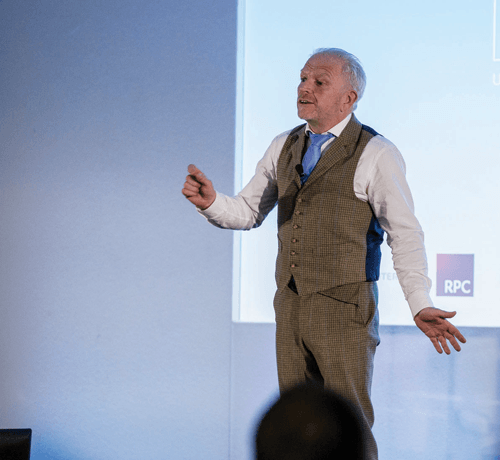‘I have relied upon lawyers so much in my commercial career; it is important you understand how much your peer group have bailed me out of the crap I have found myself in, accidentally or otherwise. I want to highlight the attributes I think are remarkable (and also those that are unhelpful) in steering a company towards success.
Aim for the top
We often focus on the hero, and many assume it’s in moments of great crisis where in-house lawyers have their best moments. But for me, the difference from being merely amazing to an actual god-like status are those who get into my face when it is nothing to do with a crisis; it’s about the proactivity.
I don’t understand why general counsel are not more likely to become CEOs. You are, by very nature, more bright than others in the boardroom: you have proved you can study, you have an amazing ability for acumen and absorbing information, and you can also communicate. Why in the UK are there not more ex-internal counsel that have become CEO? If you were a CFO between 1990–2000, you were fairly likely to be a main board director or CEO, and CEOs after that were often salespeople or marketeers, as brands and consumers were the sexy attributes. The lawyers who are more proactive for me, who are interested in performing better, are the lawyers who should have been CEO way before I got the privileged opportunity to do so.
If, after reading this interview, you have changed your aspiration about what you want to achieve, because you want to be CEO, or just that there is a lot more to your role than stopping idiots like me from ballsing-up the company, then you should reset the finish line of your career. There are actual behavioural and attitudinal changes that many internal GCs can take on to get to that finish line more swiftly from others in the executive team; I am not advocating more study or qualifications, but less time at work while achieving more. This is an attitude shift both in and out of the boardroom.
Bigger than the legal stuff
The technical side of the law is a hygiene factor – it is important stuff you need to do, but your subordinates can do that and you can efficiently supervise and motivate them to do the basics. Your job as a GC is to help run the company. Your job is to help it avoid the bad bits but also to help it go and prospect the good bits more dynamically. Given what you do as a specialism, what you know about the company, your insight into the competitive landscape and the fact that you have access to the senior board – you should be able to do more than just cover your firm’s back legally – you should address the fundaments of the strategy and business model, keeping it straight but making sure it also prospects excitingly and dynamically.
I think that GCs who are proactive in your world are the most powerful people in the boardroom; not just proactive on compliance and risk, which is your day job, but proactive on balance sheet, profit and loss, on company culture and general company health. People with your brains, communication skills, and your access and exposure, means you are uniquely qualified to be better than most CEOs. I am an example of this; I come across GCs that I think would be better at my job than I would, if they only saw it as their job to do so. You should be running the company or be a much better influence in running it.
It is about working out how to tick the boxes of the day job more quickly and efficiently so you can spend more time being dynamically insightful as to where the company could be better. Some of the more powerful ideas and innovations and events have come from the minds of lawyers, but have little to do with any aspect of the law. The role of the GC is so much bigger than legal stuff.
Doing things differently
Being a GC is about two things – nailing the detail of the day job better than ever before, then helping the board come up with razor-sharp insight. You shouldn’t be a GC unless you are brilliant at this second bit, and if you want more of this personal attainment and growth then you had better start doing things differently.
Most of the readership are part of a successful but very conservative and risk adverse-company; you might think you don’t have a chance to shine as your proactive insight in matters outside the legal context won’t be welcome – I think the opposite is true. Those companies that are deemed to be less exciting could actually give you a better chance of showing your funky stuff, because then it is easier to see when you come up with something where people say ‘damn, what an exciting, good idea!’. The smallest innovation and context has disproportionate impact here; it’s the tallest-dwarf syndrome. If you have an idea, it is that level of proactivity which gets noticed. The industry sector or your profile in the company isn’t the determinate which allows you to shine or not – it’s just the broadening of the way you consider your remit and having the bravery to speak out.
Some of the lawyers I have spoken to, less theatrical lawyers, sometimes say they don’t have the personal desire or appetite to run a company because they don’t have verbose showmanship. This is not essential. People think they can’t do more as GC, to really come out with extraordinary ideas, because their profile isn’t big enough. If you have a company where your boardroom doesn’t allow or welcome people challenging the status quo, you shouldn’t be working for the company. If your company does welcome you and you aren’t giving it, then work out why not because your career opportunity is slipping away.
Get in my face
It is not down to technology, because technology isn’t taking over your job, it is emasculating everyone else, so you can rise over the white noise. There is a slightly seductive appetite in digital reverse, the covering your back stuff which is a disease.
Be careful you especially don’t lose touch with talking to people. People are increasingly asking you opinions electronically, and you give them back electronically. There is a cancer in internal communications, and that is the ‘BCC’ of an email. There is nothing better than chatting to a colleague. You will get connectivity, and the job will be more interesting. When you give counsel electronically you are not helping to make a material difference, so get out and deliver.
Life is about contemporary original thought and then communicating that to your colleagues.
Culture change
It is not about past performance either. In most businesses, the further up the corporate ladder, the more risk averse we are. Then, the more we are paid, the more influence we have, but the less deserving of our jobs we become because we take fewer risks. This is more true in the legal sector the further you go up the ladder of progression, because you’re more likely to assume you can’t be seen to take risks. Take the risks…challenge the convention…push the scenarios; be bolder. If your past performance doesn’t demonstrate you do more than keep the company out of the courts, you will have a disproportionate impact if you do more, as well as a greater chance of reinventing your career, as people won’t traditionally expect you to add the magic dust.
It is not about ignoring the detail or forgetting the job of running a legal department. Do it brilliantly, but do the least ‘doing’ you possibly can. Do the job of the words – adding general counsel. This is only partly about the legal – do those bits stunningly well, and then you add the REAL value. In terms of company culture – it is not just about whistle-blowing but genuinely having a culture that celebrates calling a spade a spade. If you don’t have this culture of proactivity then you need to see what you can do to foster it, as it’s your job to promote a healthy culture of challenge within the company. Corporate culture is a sum of the average. If just one of us is a bit pants, it sends a message out to the others that says we can accept below-average and that simply won’t do. In a dynamic commercial world, you need to have a dynamic team who know what they are doing and not carry apathetic colleagues.
What you can be as lawyer has more to do with what you want to be, than what you are empowered to do.
Be more forward and direct. Be dynamic, honest, succinct, don’t worry about what people think of you. Don’t give a damn about that; but about making a difference with integrity, being part of a team and using the processes that support you.
Do it wrong successfully
In taking a risk, you don’t know if you have the right answer – as lawyers, there is always the disclaimer, ‘I could be wrong but…’, but when you add more value in the boardroom then there’s no need to cover your arse with caveats – just challenge. People like it when you take a contrary view, when you discuss and challenge and debate what better could look like. Coming from a lawyer it has huge resonance. Real gems come from this. Great ideas come through lawyers’ minds and mouths and it has a disproportionate impact in the boardroom, but they don’t come often enough. You need to accept risk is fine. People respect it doesn’t come naturally to you, and this is an advantage, not a disadvantage. The role of a good GC is to keep the company on the right path; the role of a great one is to run down that path and make it arrive at a much better place – they should do it or die trying.’

